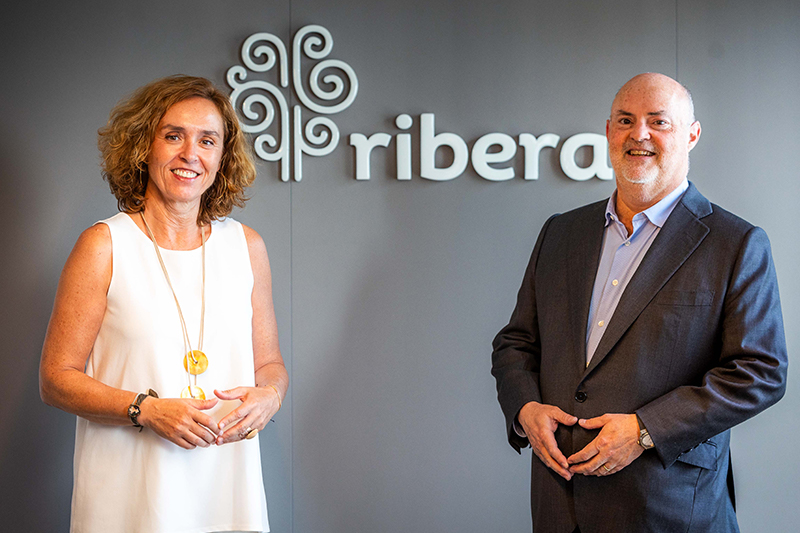- The healthcare group has invested more than 25 million euros in the renovation and purchase of new technology and infrastructures and signs a strategic agreement with Microsoft, implements new digital nutrition and telerehabilitation programmes.
- Both the three hospitals in Galicia and the three in Murcia are expanding their portfolio of health services for the population and Ribera Lab, its laboratory division, is taking on the integral biological diagnosis of the Vinalopó (Elche) and Torrejón (Madrid) areas.
Ribera continues to grow in the number of healthcare centres, services, technology and infrastructures for the healthcare of citizens. In 2023, the healthcare group has added the Cascais Hospital and the Ribera IMSKE Valencia hospital to its healthcare network, as well as the Cardiosalus group of clinics in Murcia and the Ribera Ciudad Quesada polyclinic in the Torrevieja area. With these new additions, there are now 13 hospitals in the group, which also has more than 40 polyclinics and manages more than fifty primary care centres. In addition, both the three hospitals in Galicia (Ribera Povisa, Ribera Polusa and Ribera Juan Cardona) and the three in Murcia (Ribera Hospital de Molina and the hospitals Ribera Virgen de la Caridad and Ribera Caravaca) have expanded their portfolio of health services for the population, the University Hospital of Torrejón has inaugurated a new psychiatric hospital ward and, in the first half of the year, the second private public hospital in Kuwait has been made available to the Government, the result of the project in which Ribera has collaborated with Dhaman Corporation.
In this same line of expansion and consolidation, 2023 has been a year of expansion for the group’s laboratory division, Ribera Lab, which in this period of time has taken on the integral biological diagnosis, that is, all the determinations and analyses, of the healthcare areas of Vinalopó (Elche) and Torrejón (Madrid), where it manages the respective reference hospitals, and in the first case, also Primary Care.
Technology and care milestones
The Ribera Group’s investment in technology has exceeded 25 million euros, more than half of it in health centres in Spain, 5.5 million in Cascais and almost 2.5 million in Pro Diagnostic Group, the radiology company in Central Europe. Among others, the new CAT scans at Hospital Universitario de Torrejón and Ribera Polusa, the magnetic resonance at Cascais, the SPECT-CT and the new anaesthesia towers at Vinalopó, where the Emergency Department has also been extended, the 3D mammograph at Ribera Juan Cardona and the latest generation laser to operate on benign prostate hyperplasia at Ribera Povisa, as well as the new densitometers at this hospital and at Ribera Polusa, stand out.
Technology is undoubtedly one of the facilitating elements of the group’s important healthcare milestones in the last twelve months, together with the continuous training and clinical leadership of Ribera’s professionals. Thanks to all this, for example, the Hospital Universitario del Vinalopó has successfully implanted the first wireless pacemaker and a novel technique to eliminate ventricular tachycardia; Torrejón has become a registration point in the Community of Madrid for bone marrow donors and has successfully performed its first peritoneal carcinomatosis surgery with hyperthermic chemotherapy; Ribera Juan Cardona has implemented “fast track” surgery for knee and hip prostheses and, together with Ribera Polusa, has set up the Knee and Hip School; and Ribera Hospital de Molina has incorporated laparoscopic hysterectomy via the vagina, among others. In addition, Nefrosol Salud, the group’s dialysis centre in Alicante, carried out more than 21,000 sessions with patients last year.
2023 has also been an important year for the group’s Breast Area. The Torrejón Breast Unit has performed the first cryoablation to eliminate cancerous cells in the breast and an endoscopic mastectomy; in Vinalopó it has implemented an early discharge protocol for mastectomised women and is a pioneer in breast reconstructions with the patient’s own mass and tissue; and in Ribera Hospital de Molina it has launched a new early detection service for breast cancer. In addition, its coordinating team has organised and participated in national and international courses and congresses and has worked on 4 publications in national and international journals.
Innovation and research
In the area of digitalisation, the Ribera Group has taken a qualitative leap forward with the signing of a strategic agreement with Microsoft to promote innovation and artificial intelligence in the healthcare sector, through its Futurs technology. It has also consolidated co-innovation projects under the corporate agreement with Lanzadera, such as digital nutrition to improve the health of patients with renal and oncohaematological diseases, teledermatology, to improve the diagnosis and treatment of skin diseases through artificial intelligence, and telerehabilitation, which combines face-to-face and remote sessions -also with AI- to assist patients with prescribed treatments. It has also implemented the virtual caregiver Lola in the programme for monitoring chronic patients and Home Hospitalisation (UHD) in three of the Group’s hospitals, and relaunched the Group’s digital psychology service, Minds.
Last year saw the first steps taken by the Ribera Salud Foundation, which promotes healthcare research in the group’s hospitals, has agreements with other foundations such as Pondera, in this case for international development cooperation, and leads participation in the European ODELIA project on Artificial Intelligence and massive data analysis to prevent breast cancer, among others.
In addition, in the first year of management of the Cascais Hospital, the group has promoted the implementation of the Innovation Health Center in this health centre, and the Research Unit of the Ribera Polusa hospital started operating, both with experienced teams and cutting-edge programmes.
Sustainability, prizes and awards
Corporate Social Responsibility, as well as the group’s commitment to the Sustainable Development Goals (SDGs) and the 2030 Agenda, has been another of the group’s strategic lines in the year just ended. The projects with Discamino, including corporate volunteering, and the Camino de Cervantes, of the Hospital de Torrejón, with hundreds of participants on each route, are confirmed as the most outstanding social initiatives. In addition, the group has already implemented patient councils in most of its healthcare centres, mobile libraries have been set up in several hospitals, and the workshops, patient schools and visits that were suspended with Covid have been resumed. In addition, Torrejón has humanised paediatric emergency consultations to improve the emotional wellbeing of children and Vinalopó has developed the “Guide for a space superhero” to reduce children’s fear in the emergency department, among others.
In the environmental and quality area, one of the most noteworthy milestones is that 84% of the energy of the group’s hospitals and clinics was already from renewable sources in 2023, all audited centres have reduced their carbon footprint (overall, the group accumulates a reduction of 40% since 2020) and the most demanding quality certifications, such as the Joint Commission International, have been renewed.
Agreements have also been signed and renewed with various sports clubs in all areas of the Group’s healthcare centres to promote healthy lifestyle habits through sport, collaborations have been strengthened with international cooperation organisations in which our professionals participate, and music has been confirmed as a very important therapeutic element, complementary to clinical care. In addition to micro-concerts and music therapy, in 2023 the group has developed the Rhythms of Life campaign, which unites music and health, and which last year focused on the prevention of cardiovascular diseases with the creation of the first ever arrhythmic metronome. In fact, this campaign has received numerous awards and recognitions such as those of the La Lluna Festival, the Aspid, Saniss Health or New Medical Economics. In addition, Ribera hospitals have received seven TOP20 awards, three of them for global management, the CEO, Elisa Tarazona, has been chosen among the TOP100 women leaders in Spain and its president, Alberto de Rosa, has received several awards for his career and work.
Projects such as digital nutrition were recognised with the Digital Health award for the best telemedicine initiative and the Aspid awards also went to the virtual caregiver Lola. Hospitals such as the Cascais Hospital have been distinguished with an Honourable Mention of the Prémio Saúde Sustentável and numerous professionals, areas and services have had their work recognised by independent entities and organisations.
Caregivers
The People policy has once again placed the Ribera Group in the ranking of the 100 best companies to work for in Spain, where it has consolidated its position thanks to its commitment to employment stability, equality, work-life balance, internal promotion and continuous training, among other aspects. The Group’s hospitals and their professionals have participated in national and international congresses and conferences and, for example, played a prominent role in the National Hospitals Congress, with 17 posters and five oral communications.
One of the most innovative initiatives this year was the “Summer experience” talent plan, to attract recently graduated nursing professionals, facilitate their first steps in the sector and guarantee good coverage during the summer months, especially in centres located in tourist areas. The Ribera Life programme for employee wellbeing has been consolidated this year with various activities to promote corporate volunteering and the first paddle tennis tournament for the group’s professionals, among other actions.
Finally, this year Ribera hospitals have successfully offered 72 MIR and 15 EIR places in fifteen clinical and surgical specialties with the aim of highlighting the quality of training in the four teaching hospitals, the high involvement of the tutors and the development of technical and surgical skills of the interns in an early, progressive and supervised manner, as they are medium-sized hospitals.


Recent Comments